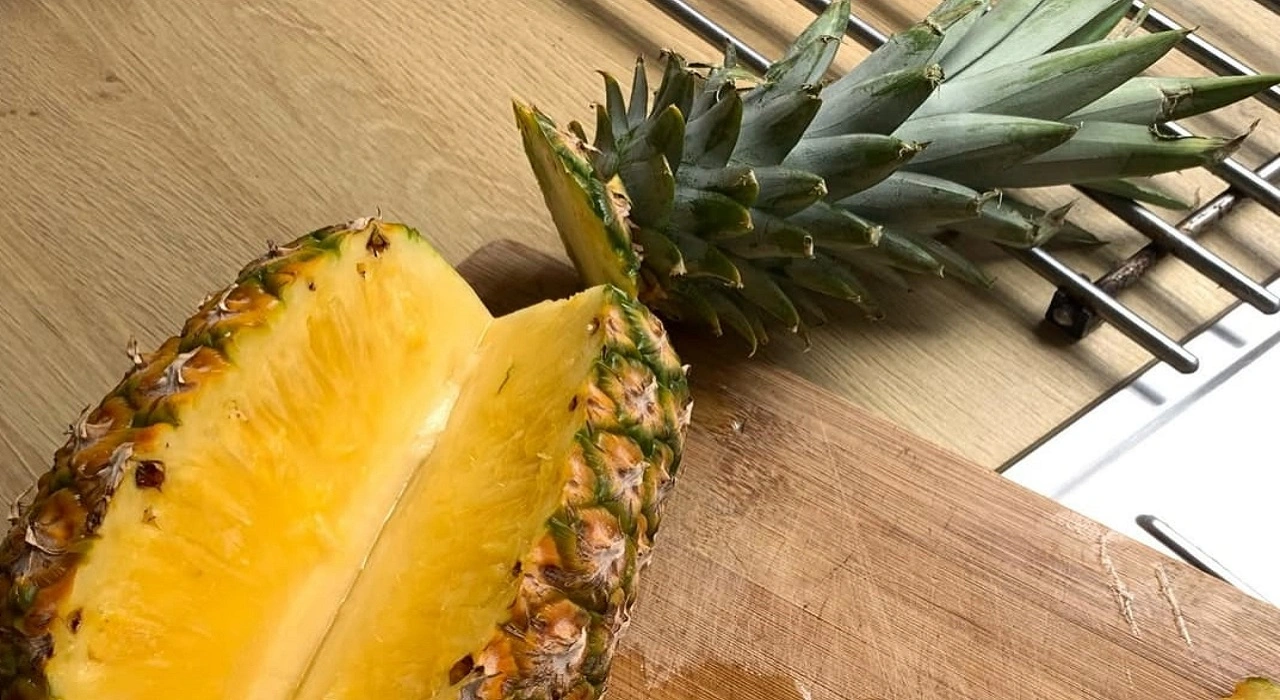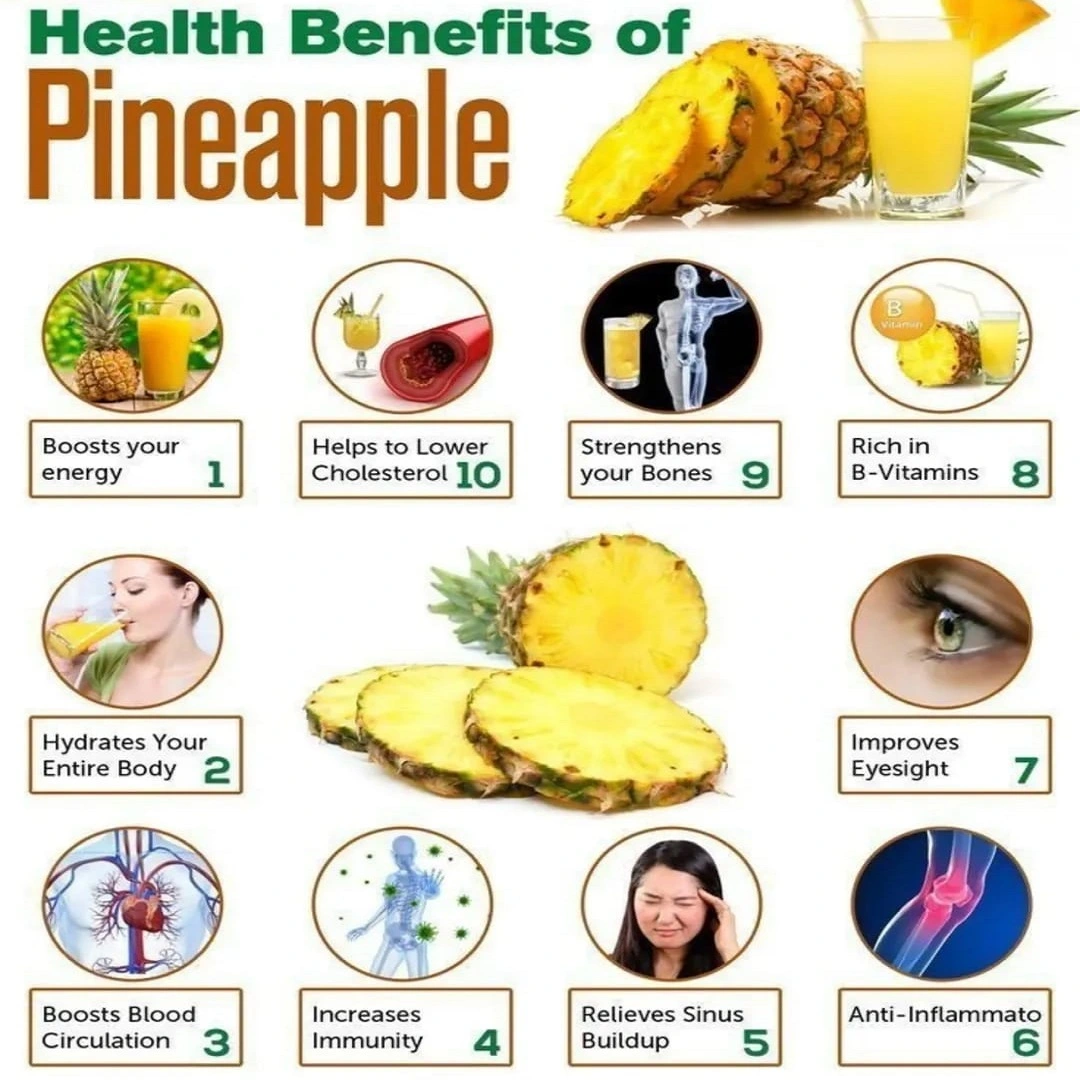Introduction
Pineapple is one of the most loved tropical fruits around the world. With its juicy sweetness and a hint of tanginess, Ananas isn’t just delicious it’s also packed with nutrients and health benefits. Whether you enjoy it fresh, juiced, grilled, or in smoothies, pineapple brings both flavor and goodness to your diet.
In this article, we’ll explore the many benefits of ananas, its nutritional value, fun ways to include it in your meals, and answer some common questions people have about this exotic fruit.

What is Pineapple?
Pineapple (Ananas comosus) is a tropical fruit native to South America, particularly Paraguay and Brazil. It belongs to the bromeliad family and is grown in many warm climates around the world today, especially in countries like the Philippines, Thailand, India, and Costa Rica.
Ananas is known for its tough spiky skin, golden flesh, and refreshing taste. It’s commonly used in juices, desserts, fruit salads, and even savory dishes like pizza and curries.
Nutritional Value of Pineapple
This fruit is low in calories but high in important vitamins and minerals. One cup (165 grams) of fresh pineapple chunks contains:
- Calories: 82.5
- Carbohydrates: 21.6 g
- Sugar: 16.3 g
- Fiber: 2.3 g
- Vitamin C: 131% of the Daily Value (DV)
- Manganese: 76% of the DV
- Vitamin B6: 9% of the DV
- Copper: 9% of the DV
Thanks to these nutrients, pineapple supports immunity, aids digestion, and boosts energy naturally.

Health Benefits of Pineapple
1. Boosts Immunity
Ananas is rich in vitamin C, a powerful antioxidant that strengthens your immune system. Regular consumption can help fight off colds, flu, and other infections.
2. Aids Digestion
Ananas contains bromelain, an enzyme that helps break down proteins. This can improve digestion, especially after heavy meals. It also supports gut health by reducing bloating and constipation.
3. Promotes Healthy Skin
Thanks to its high vitamin C content, ananas helps in collagen production. This keeps your skin firm, glowing, and youthful. Bromelain also has anti-inflammatory properties that can reduce acne.
4. Supports Bone Health
The manganese in ananas plays a role in bone strength and connective tissue health. Including pineapple in your diet can help prevent bone-related issues as you age.
5. Reduces Inflammation
Bromelain also works as a natural anti-inflammatory. It may reduce swelling, bruising, and even arthritis pain. Some studies show it may help after surgery or injury for faster recovery.
6. Improves Eye Health
Ananas contains antioxidants like beta-carotene and vitamin A that promote good vision and protect against age-related eye problems like macular degeneration.
7. Helps in Weight Management
Low in calories and high in water and fiber, ananas keeps you full for longer. This can help curb overeating and support weight loss or maintenance.
8. Supports Heart Health
The antioxidants and bromelain in ananas may support heart health by reducing blood clots and lowering cholesterol levels.
How to Eat Pineapple
There are so many fun and tasty ways to enjoy pineapple:
- Fresh pineapple slices as a snack
- Ananas juice or smoothie
- Grilled ananas with a hint of cinnamon
- Ananas in fruit salads or yogurt bowls
- Pineapple chunks in stir-fries or curries
- Topping for pizza (yes, it’s controversial but tasty!)
You can even freeze ananas chunks for a cool summer treat or blend them into mocktails and tropical drinks.
Fun Facts About Pineapple
- Ananas don’t grow on trees—they grow from the ground on a small plant.
- It takes almost 2 years for one pineapple to fully mature.
- The ananas is actually a group of berries fused together, called a “multiple fruit.”
- In many cultures, the ananas is a symbol of hospitality and warmth.
Possible Side Effects
While pineapple is generally safe and healthy, it’s best to eat it in moderation:
- Overeating may cause mouth irritation due to bromelain.
- It’s naturally high in sugar, so people with diabetes should consume it mindfully.
- Some people may have allergic reactions, including itching or swelling.
If you’re unsure, consult a healthcare professional before making it a big part of your diet.
Why Pineapple is a Must-Have Fruit
We’ve covered a lot, and it’s clear that pineapple is more than just a tropical treat. It’s a nutrient-rich, immune-boosting, and skin-friendly fruit that can easily become a regular part of your healthy diet. From aiding digestion to protecting your eyes, ananas deserves a place in your kitchen and on your plate.
Whether you blend it into smoothies or add it to savory dishes, ananas is one fruit that’s as versatile as it is beneficial. So the next time you’re at the store, don’t forget to grab a ananas and give your health a natural boost.
Frequently Asked Questions (FAQ)
Q1. Is pineapple good for weight loss?
Yes! Pineapple is low in calories and high in fiber, which can help you feel full and reduce hunger cravings. It’s a great fruit for weight management.
Q2. Can I eat ananas every day?
Yes, you can eat ananas daily in moderation. However, avoid eating too much, as it may cause mouth irritation or affect blood sugar levels.
Q3. Is pineapple safe during pregnancy?
Ananas in moderate amounts is generally safe during pregnancy and can help with digestion. But consult your doctor if you have concerns.
Q4. Does pineapple help with inflammation?
Yes, thanks to bromelain, ananas has anti-inflammatory properties that may reduce swelling and promote healing.
Q5. Is canned ananas as healthy as fresh?
Canned ananas often contains added sugars. If you’re choosing canned, go for the one with no added sugar or packed in natural juice.
If you enjoyed this post, share it with your friends and try including pineapple in your meals. Your body and your taste buds will thank you!